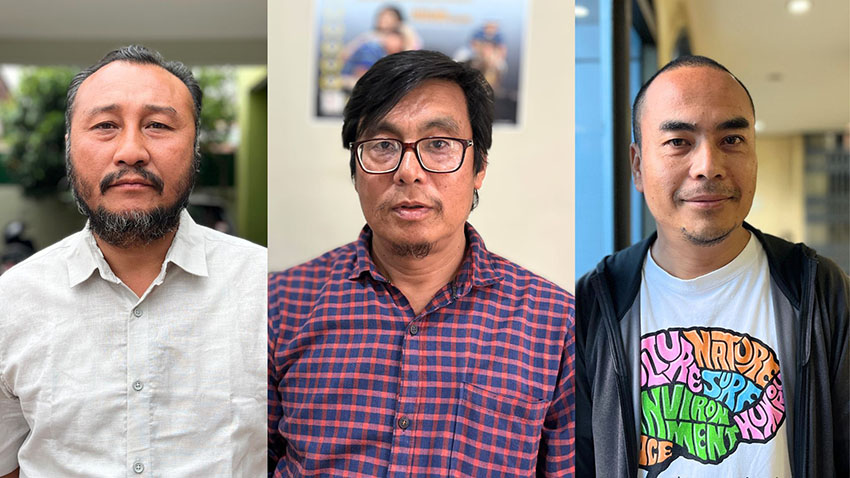As Gandhi said, “The greatness of humanity is not in being human, but in being humane”. This reminds us that the essence of humanity lies in our ability to care for other, fostering a world that priorities compassion and unity. This is exemplified by Mother Teresa who dedicated her life to serving the most impoverished and neglected. Her legacy embodies the true essence of humanity and serves as an enduring inspiration for future generations.
In the era marked by unprecedented challenges and issues like inequality, conflict and strife, atrocities, violence, technological disruptions, war and nuclear threat, the spirit of humanity remains a powerful and a increasingly vital force.
And in this digital age where advancements flourish, it breeds isolation, misinformation, concerns over privacy and hate comments or speech on social media platforms poses a serious threat to societal cohesion, fueling division and hostility undermining the human values such as empathy, trust, compassion and respect, that binds us together. As we enter an age where AI-a soulless entity-surpasses human development and merges with our human race , forming a new hybrid existence, we are compelled to ask: what does it truly mean to be human in this fusion?
In addition to these challenges, the ongoing wars and conflicts that continue to rage around the world pose a serious threat to humanity. The wars in Ukraine ignited by Russia’s invasion, Syria, Yemen and the ongoing Israel-Palestine conflict, all these wars are not just battling between nations; they are devastating human tragedies that leave lasting scars. The violence and suffering challenge the core principles of human values such as peace and justice, as innocence lives are caught in the midst of the conflict.
As we confront issues that threaten our shared values , it is important to consider: What is the biggest challenge humanity faces today? And how do we address them effectively? Whether addressing climate change, responding to humanitarian crises, ensuring health equity, quality education or combating misinformation our actions must reflect a commitment to a greater good. If every individual lived by the thought, ‘How can I serve humanity?’ it would inspire profound positive change in the world. The Dalai Lama’s words resonate deeply “The world belongs to humanity, not this leader, that leader, or that king or prince or religious leader. The world belongs to humanity”.
Humanity Thrives Amidst Adversity
Humanity’s ability to thrive amidst adversity is evident in recent key examples, where resilience, solidarity and hope have emerged, despite overwhelming challenges.
The recent global pandemic highlighted the importance of empathy and the profound spirit of humanity to stay connected while maintaining physical distancing. The global response to the COVID-19 pandemic showcased humanitarian efforts across border and international cooperation.
And during the devastating Australian bushfires(2019-2020), which burned millions of acres and displaced thousands of people, the outpouring of support from both within Australia and Internationally was overwhelming. In the face of one of the country’s worst natural disasters underscored how humanity can come together in times of crisis to offer hope, help and solidarity.
The 2020-21 farmers’ protest in India demonstrated the resilience of the farmers and their ability to unite for a common cause of justice and dignity, that inspire widespread support from across India and other parts of the world, making it a significant chapter in India’s history.
As also seen in the aftermath of the devastating floods that swept through Pakistan in 2022, displacing millions, inspired a wave of humanitarian support from all over the world. India’s response- providing aid and essential supplies underscored the power of compassion to transcend political divides.
Similarly, the ongoing conflict in Manipur highlights a powerful message of resilience, as tensions escalated local organizations and citizens quickly mobilized to provide relief to those affected by the violence. Volunteers from various backgrounds came together to distribute food, clothing, medical supplies and essential items to displaced families and in relief camps. This grassroot effort showcased a remarkable level of empathy, transcending ethnic and communal divide. On the other hand, is Plato vision of a just society, where leaders act in the best interest of all, upheld by both the leaders and the citizens of State?
Amidst this adversity, the state’s journey is a call to action for us all to nurture the spirit of humanity. And to use our voice for kindness and our mind for truth and our heart for love. As Abdul Kalam said, “Life is beautiful one day, one hour, one minute, will not come again in your entire life. Avoid fights, angriness and speak lovely to every person”. However, as Manipur state is in a state of crisis, which was once known for its harmony and vibrant cultural unity, we cannot help but miss those times. The ongoing ethnic strife in Manipur has induce to reflect :where have our human virtues vanished? As we see a profound breakdown of humanity and compassion, with the countless innocent lives lost and women subjected to horrific violence.
Buddha said,“ Just as a candle cannot burn without fire, man cannot live without a spiritual life”. Defining the role of humanity as the essence of life on earth , has been shaped by various philosophical, spiritual and religious traditions with the Bible offering one of the earliest and most influential perspectives on human responsibility and purpose. Whether its the sacrificial love of Jesus, the deep friendship of David and Jonathan, love reign supreme and holds the key essence of humanity life. As Paul writes in Romans 12:10, “Be devoted to one another in love. Honor one another above yourselves”. Similarly, in Plato’s work Symposium presents the Platonic concept of love that transcends physical or romantic attraction and focuses the pursuit of beauty and truth at a higher, spiritual level. Likewise, in the work of St. Thomas Aquinas, Summe Theologica, presents Caritas (charity) as the highest form of love, emphasizing it as selfless love that seeks the good of others. Vivekananda in his lectures, particularly ‘practical Vedanta’ and ‘Bhakti Yoga’ highlights live as a force that transcends personal desires and fosters universal compassion and service to humanity, seeing the divine in all human beings. It becomes clear that love in its highest form is not merely an emotion but a guiding force for personal and collective transformation of the society.
Amid life’s challenges, we often prioritise material pursuits over spiritual growth, chasing dreams, wealth, success, and power striving to create an outwardly perfect life. In doing so, we often neglect the importance of balancing our inward journey which is essential for leading a truly fulfilling life. As human, we are also often trapped in cycles of conflict, hatred, jealousy- judging others, more than we reflect on ourselves, failing to embrace the fact that we are all imperfect beings. All these negative forces create unnecessary strife and divide us. So, now, more than ever, it is necessary to balance our material pursuits and spiritual well-being, both of which are in need of time and attention. When we pause and reflect on the truth that we are all born to die one day and that our time on Earth is uncertain, we realize how precious and fragile life truly is. Much like Don Williams’ song, ‘This World Is Not My Home’, the lyrics reflects our impermanence. So, why should we waste our limited time fighting over such transient matters? As the world observes World Humanitarian Day on 19th August annually, we are reminded to embrace compassion and strive to make a meaningful impact. It is love, empathy, integrity and universal brotherhood that defines our true purpose on earth, not the challenges we overcome or the victories or losses we experience. As Albert Einstein famously said. “The highest form of knowledge is empathy, for it requires us to suspend our egos and live in another’s world”. By embracing this wisdom, let us foster humility, love, kindness to ensure humanity’s virtues thrive. Let humanity reign.

The writer is Asst. Prof. Dept of Political Science, St. Joseph College, Ukhrul. The views expressed are writers own.











